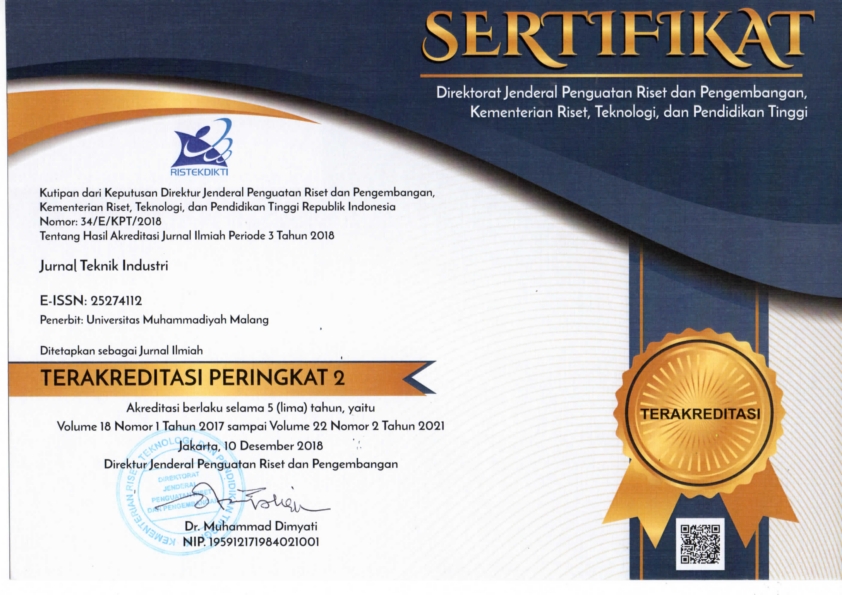The Influence of Turnover Factors Toward Employees’ Intention to Stay: A Case Study in Indonesian Islamic Universities
DOI:
https://doi.org/10.22219/JTIUMM.Vol21.No1.80-91Keywords:
Religiosity, Job satisfaction, Organizational commitment, Intention to stay, Employee turnoverAbstract
This study analyzed employee turnover factors, such as satisfaction, organizational commitment, and religiosity, to predict the employees’ intention to stay. Very few studies in the Muslim context have explored such a corporate attitude from job satisfaction and organizational commitment. This study employed a quantitative and descriptive research design. A survey was used to analyze the correlation between some predictors of the employees’ intention to stay. In particular, it attempted to show that religiosity affected both job satisfaction and organizational commitment either directly or indirectly. The data were obtained from 150 employees in some Islamic universities in Malang, Indonesia. The findings revealed that religious beliefs influenced job satisfaction. Job satisfaction significantly affected the employees' commitment. Religiosity directly impacted corporate commitment through job satisfaction, and religiosity was positively related to the employees' intention to stay. Regarding this, the employees who keep religious beliefs in the workplace are encouraged to perform excellently.
Downloads
References
[1] S. E. Jackson and R. S. Schuler, "Understanding human resource management in the context of organizations and their environments," Annual review of psychology, vol. 46, pp. 237-264, 1995. https://doi.org/10.1146/annurev.ps.46.020195.001321.
[2] D. Dhanraj and S. B. Parumasur, "Perceptions of the impact of job rotation on employees, productivity, the organization and on job security," Corporate Ownership & Control, vol. 11, pp. 682-691, 2014.
[3] J. B. Tracey and T. R. Hinkin, "Contextual Factors and Cost Profiles Associated with Employee Turnover," Cornell Hospitality Quarterly, vol. 49, pp. 12-27, 2008. https://doi.org/10.1177/0010880407310191.
[4] M. A. Abelson and B. D. Baysinger, "Optimal and Dysfunctional Turnover: Toward an Organizational Level Model," Academy of Management Review, vol. 9, pp. 331-341, 1984. https://doi.org/10.5465/amr.1984.4277675.
[5] J. E. King and I. O. Williamson, "Workplace Religious Expression, Religiosity and Job Satisfaction: Clarifying a Relationship," Journal of Management, Spirituality & Religion, vol. 2, pp. 173-198, 2005. https://doi.org/10.1080/14766080509518579.
[6] E. J. Kutcher, J. D. Bragger, O. Rodriguez-Srednicki, and J. L. Masco, "The Role of Religiosity in Stress, Job Attitudes, and Organizational Citizenship Behavior," Journal of Business Ethics, vol. 95, pp. 319-337, 2010. https://doi.org/10.1007/s10551-009-0362-z.
[7] N. Wening and A. Choerudin, "The influence of religiosity towards organizational commitment, job satisfaction and personal performance," Polish Journal of Management Studies, vol. 11, 2015. www.yadda.icm.edu.pl:80/baztech/element/bwmeta1.element.baztech-dfdfa05f-ed48-4860-b229-082303579517;jsessionid=36629156BF6B1EFEEFF7938125C61E30.
[8] L. J. Williams and J. T. Hazer, "Antecedents and consequences of satisfaction and commitment in turnover models: A reanalysis using latent variable structural equation methods," Journal of applied psychology, vol. 71, p. 219, 1986. www.psycnet.apa.org/doi/10.1037/0021-9010.71.2.219.
[9] A. Cohen, "Antecedents of organizational commitment across occupational groups: A meta-analysis," Journal of Organizational Behavior, vol. 13, pp. 539-558, 1992. https://doi.org/10.1002/job.4030130602.
[10] N. Bouarif, "Predicting organizational commitment: The role of religiosity and ethical ideology," European Scientific Journal, vol. 11, 2015.
[11] E. Sikorska-Simmons, "Predictors of Organizational Commitment Among Staff in Assisted Living," The Gerontologist, vol. 45, pp. 196-205, 2005. https://doi.org/10.1093/geront/45.2.196.
[12] T. L. Davis, B. A. Kerr, and S. E. R. Kurpius, "Meaning, Purpose, and Religiosity in at-Risk Youth: The Relationship between Anxiety and Spirituality," Journal of Psychology and Theology, vol. 31, pp. 356-365, 2003. https://doi.org/10.1177/009164710303100406.
[13] O. Okpara John, "Personal characteristics as predictors of job satisfaction: An exploratory study of IT managers in a developing economy," Information Technology & People, vol. 17, pp. 327-338, 2004. https://doi.org/10.1108/09593840410554247.
[14] M. B. Frye, "Equity-Based Compensation for Employees: Firm Performance and Determinants," Journal of Financial Research, vol. 27, pp. 31-54, 2004. https://doi.org/10.1111/j.1475-6803.2004.00076.x.
[15] M. M. Parvin and M. N. Kabir, "Factors affecting employee job satisfaction of pharmaceutical sector," Australian journal of business and management research, vol. 1, p. 113, 2011.
[16] L. Firth, J. Mellor David, A. Moore Kathleen, and C. Loquet, "How can managers reduce employee intention to quit?," Journal of Managerial Psychology, vol. 19, pp. 170-187, 2004. https://doi.org/10.1108/02683940410526127.
[17] R. Gersten, T. Keating, P. Yovanoff, and M. K. Harniss, "Working in Special Education: Factors that Enhance Special Educators' Intent to Stay," Exceptional Children, vol. 67, pp. 549-567, 2001. https://doi.org/10.1177/001440290106700408.
[18] C.-S. Lee and C.-W. Chao, "Intention to “Leave” or “Stay” – The Role of Internship Organization in the Improvement of Hospitality Students’ Industry Employment Intentions," Asia Pacific Journal of Tourism Research, vol. 18, pp. 749-765, 2013. https://doi.org/10.1080/10941665.2012.695290.
[19] M. Alausa Waheed, "Perceived Job Insecurity, Sex and Age as Predictors of Turnover Intentions among Employees of Merged Banks," 2012.
[20] W. H. Mobley, R. W. Griffeth, H. H. Hand, and B. M. Meglino, "Review and conceptual analysis of the employee turnover process," Psychological Bulletin, vol. 86, pp. 493-522, 1979. https://doi.org/10.1037/0033-2909.86.3.493.
[21] A. H. Khan and M. Aleem, "Impact of job satisfaction on employee turnover: An empirical study of Autonomous Medical Institutions of Pakistan," Journal of International Studies, vol. 7, pp. 122-132, 2014. https://doi.org/10.14254/2071-8330.2014/7-1/11.
[22] E. I. Olowookere, O. A. Adekeye, G. O. Adejumo, B. C. Agoha, and M. A. Sholarin, "Influence of religiosity on turnover intention : empirical evidence from Sselected employees in Lagos and Ogun States," IFE PsychologIA : An International Journal, vol. 24, pp. 132-138, 2016. www.hdl.handle.net/10520/EJC-59aab8679.
[23] M. E. Malik and B. Naeem, "Role of spirituality in job satisfaction and organizational commitment among faculty of institutes of higher learning in Pakistan," African journal of business management, vol. 5, p. 1236, 2011. https://doi.org/10.5897/AJBM10.642.
[24] N. Hassan, A. Mohammad, F. Mohd, A. Rozilah, and S. Ali, "Religiosity perceptions and employee turnover intention in Malaysia," International Journal of Social Science and Humanity, vol. 5, pp. 120-125, 2015. https://doi.org/10.7763/IJSSH.2015.V5.436.
[25] J. Milliman, A. J. Czaplewski, and J. Ferguson, "Workplace spirituality and employee work attitudes: An exploratory empirical assessment," Journal of organizational change management, vol. 16, pp. 426-447, 2003. https://doi.org/10.1108/09534810310484172.
[26] I. Ghazzawi and Y. Smith, "Crafting the whole employee: Job satisfaction, job commitment, and faith-a new conceptual framework and research agenda," The business review, vol. 12, pp. 300-309, 2009.
[27] Z. O. Salem and S. O. S. Agil, "The effects of islamic individuals' ethics on organizational commitment of employees in Libyan public banks," British Journal of Arts and Social Sciences, vol. 9, pp. 64-78, 2012.
[28] Y. Kudo, T. Satoh, K. Hosoi, T. Miki, M. Watanabe, S. Kido, et al., "Association between Intention to Stay on the Job and Job Satisfaction among Japanese Nurses in Small and Medium-sized Private Hospitals," Journal of Occupational Health, vol. 48, pp. 504-513, 2006. https://doi.org/10.1539/joh.48.504.
[29] S. M. Azeem, "Job satisfaction and organizational commitment among employees in the Sultanate of Oman," 2010. https://doi.org/10.4236/psych.2010.14038.
[30] R. Zafar, M. Altaf, M. M. M. Bagram, and H. Hussain, "Religiosity, as determinant of turnover intention: An exploratory study," 2015.
[31] D. F. Birks and N. K. Malhotra, Marketing Research: an applied approach: Pearson Education UK, 2006.

Downloads
Published
How to Cite
Issue
Section
License
Copyright (c) 2020 Nazaruddin Malik

This work is licensed under a Creative Commons Attribution-ShareAlike 4.0 International License.











